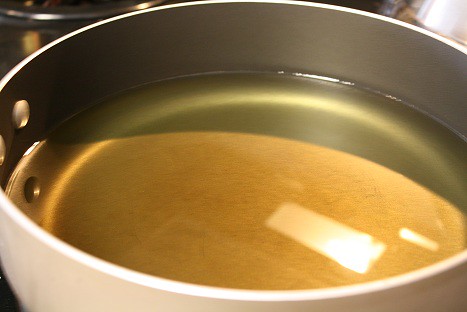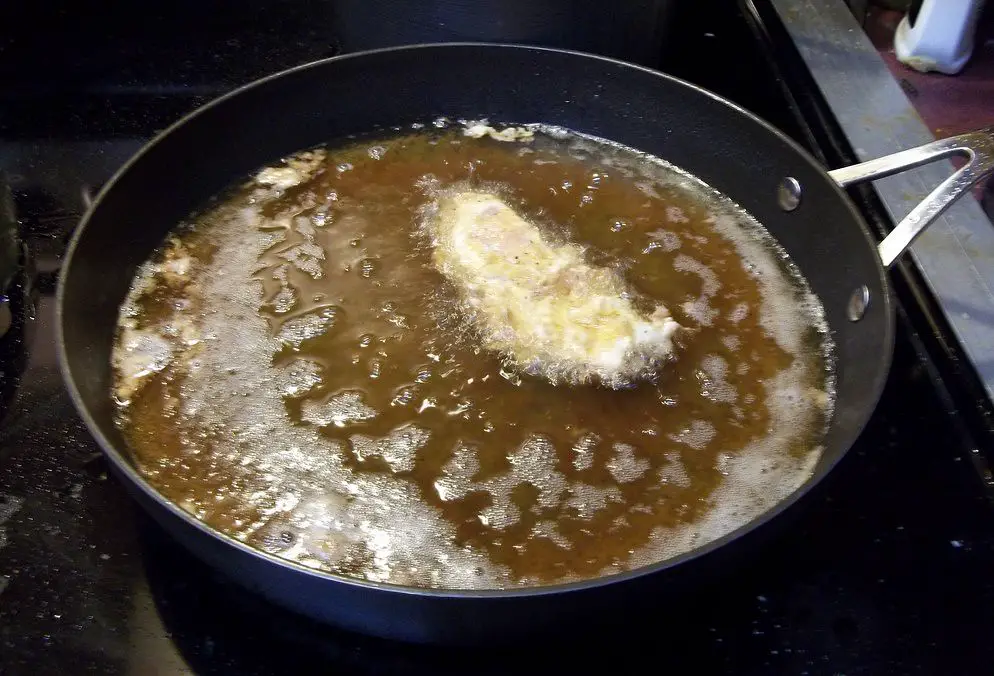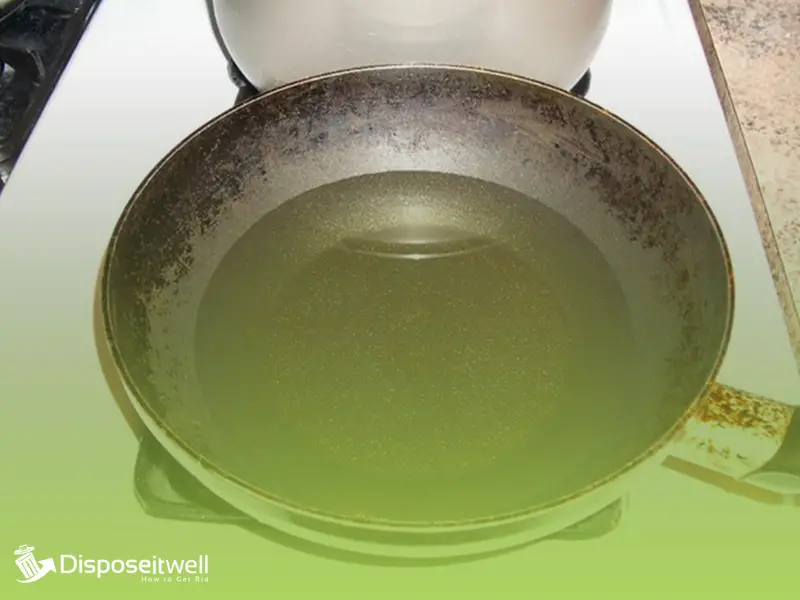Do you ever wonder what to do with all that leftover frying oil after cooking a delicious meal? If so, you’re not alone. Getting rid of frying oil properly can be tricky and many people are unsure of the best way to go about it.
The National Library of Medicine has uncovered that the careless disposal of used frying oil is a major issue with numerous ecological, environmental, and municipal ramifications. Hence it’s important to undergo this process efficiently.
The best way to dispose of used cooking oil is to let it cool down, strain it through a paper towel or coffee filter, and then put it in a sealed container before placing it in the garbage.
Alternately, many local waste management centers offer oil recycling services.
Safely Disposing of Used Frying Oil
It’s essential to dispose of used cooking oil responsibly, as it can pose risks to the environment and public health. Here are some suggestions for safely discarding frying oil:
Absorb and discard with household items:
Store the used frying oil in a leak-proof container to prevent spills. Once full, use paper towels or newspapers to absorb the oil, reducing the likelihood of drain blockages. Wrap the oil-soaked paper in additional layers and throw it away in the trash.
Seek help from local restaurants:
Inquire about oil disposal practices at nearby restaurants. Many establishments have systems in place for proper oil disposal, whether through on-site containers or hazardous waste facilities. They can provide guidance on how to repurpose your used oil responsibly.
Consult a disposal service:
If you don’t have access to a restaurant that manages used frying oil, reach out to a specialized disposal company. These businesses handle used cooking oil disposal and can collect the oil directly from your location.
Employ a grease disposal system:
A grease disposal system offers a convenient and mess-free solution for disposing of used frying oil. Simply pour the oil into the device, and it will handle the rest. This option is particularly helpful if disposal services or restaurant assistance are unavailable.
Incorporate into compost:
Adding used frying oil to a compost bin can contribute valuable nutrients to the compost. Ensure the bin is made of oil-resistant materials and is secured from animals. Pour the oil into a lidded container before adding it to the bin, mixing it thoroughly with the compost material.
Combine with other solid waste materials:
Mix used frying oil with solid waste materials such as leaves, grass clippings, sawdust, or shredded paper/cardboard to ensure safe disposal. When handling the oil, wear gloves and protective gear to avoid direct contact. Place the mixture in a sealed container, like a plastic bag or bucket, and dispose of it safely.
How To Reuse Cooking Oil

The benefits of reusing frying oil are numerous, not only does it reduce waste and save money, but it also has many great uses. Here are a few simple ways to get the most out of your oil:
1. Make Soap: Frying oil can be used to make soap. The process involves combining the oil with sodium hydroxide (lye), water, and other ingredients such as fragrances, colorants, and additives. The mixture is then heated and stirred until it thickens, at which point it is poured into molds and left to harden.
2. Make Biofuel: Frying oil can be converted into biodiesel, a renewable form of fuel suitable for use in diesel engines. This phenomenon involves mixing the oil with an alcohol, such as methanol, and a catalyst such as sodium hydroxide or potassium hydroxide. The mixture is then heated and allowed to cool, precipitating out biodiesel.
Moreover, according to National Geographic, Restaurants, and commercial facilities have the potential to have their 3 billion gallons of used cooking oil per year reborn. This waste oil can be recycled and transformed into biodiesel, which is a truly remarkable transformation.
3. Use as Fertilizer: This substance can also be used as a fertilizer. The oil acts as an organic mulch, trapping moisture and helping to regulate soil temperature. It also provides essential nutrients to plants, such as nitrogen, phosphorus, and potassium.
4. Use as Animal Feed: Adding frying oil to the feed of farm animals can prove to be beneficial, as it can provide them with the essential fatty acids they need. Not only can it be a great supplement, but it could also be an economical way to ensure they get the nourishment they require.
5. Use as Animal Lubricant: Frying oil can provide more than just flavor to your favorite fried foods as it can also be a fantastic lubricant for animals. An ideal choice to lubricate hooves and other grooming tools such as shears and clippers, it’s a great way to make caring for your pet a whole lot easier.
How to Store Used Oil
It’s essential to preserve the environment, and one way of doing this is to properly handle and store used oil, a hazardous material. Below are some suggestions for keeping used oil safely stored:
1. Collect used oil in clean, closed containers: Used oil should be collected in clean, closed containers such as drums, jugs, or buckets. Make sure that the containers have tight-fitting lids and are labeled correctly to identify the contents.
2. Place containers on secondary containment: Containers of used oil should be placed on secondary containment, such as trays, shelves, or pallets. This will ensure any spills or leaks are contained and will not contaminate the environment.
3. Check containers periodically: Check the containers of used oil periodically to make sure they are in good condition and are not leaking. If a leak is detected, the container should be replaced immediately.
4. Store used oil in a cool, dry place: Keep used oil out of harm’s way by storing it in a cool, dry place, away from any heating sources or combustibles. Ensure the containers are kept in a shady spot, away from direct sunlight.
Dos and Don’ts while disposing of Cooking Oil

Dealing with cooking oil requires careful consideration, as disregarding its disposal can cause hazardous environmental issues. Follow these Dos and Don’ts to properly manage cooking oil and protect our planet:
Dos:
1. Pour the oil into a container with a lid: Pouring hot oil into a container with a lid is the safest way to dispose of cooking oil, as it prevents the oil from spilling and making a mess.
2. Let the oil cool: Pouring hot oil can cause it to splatter, so it’s best to let the oil cool before disposing of it.
3. Add the oil to a solid waste bin: Once the oil has cooled, pour it into a solid waste bin and make sure it is securely covered.
4. Rinse the container: After you’ve disposed of the oil, rinse the container with warm soapy water to remove any remaining traces.
Don’ts:
1. Don’t pour the oil down the drain: Pouring oil down the drain can clog pipes and create a hazardous environment for wildlife.
2. Avoid pouring the oil directly into the trash: Pouring hot oil directly into the trash can causes it to leak and make a mess.
3. Never mix the oil with other liquids: Mixing oil with other liquids such as water can create hazardous chemicals and should be avoided.
4. Avoid throwing oil into the environment: Throwing oil into the environment will pollute the soil and water and should be avoided at all costs.
FAQs
Q: When is it time to dispose of frying oil?
It is recommended that you dispose of frying oil after two or three uses. Frying oil can become contaminated with food particles and lose its flavor and nutritional value over time.
It can also become rancid or contain foreign particles or bacteria which can be harmful if ingested. Additionally, oil that has been used for deep-frying can become carcinogenic and should not be reused.
Q: Why not pour frying oil down into the drain?
Pouring frying oil down the drain is not advisable because it can cause clogs and blockages in the pipes. The oil will coagulate and adhere to the sides of the pipes, eventually forming a thick, sludgy layer that can prevent water from draining properly.
Over time, this buildup of oil can restrict the flow of water and cause the pipes to burst. Additionally, pouring oil down the drain can contaminate local water sources and disrupt the environment.
Final Verdict
To wrap it up, properly disposing of oil used to fry food can be a cumbersome chore, but it doesn’t have to be. With a little bit of planning and the right materials, you can safely and easily dispose of your frying oil.
And by doing so, you’ll be helping to keep our environment clean and healthy for generations to come. So don’t forget to dispose of your oil correctly as it’s simple and it’s smart!

Gemma Alexander has an M.S. in urban horticulture and a backyard filled with native plants. After working in a genetics laboratory and at a landfill, she now writes about the environment and recycling topics.

